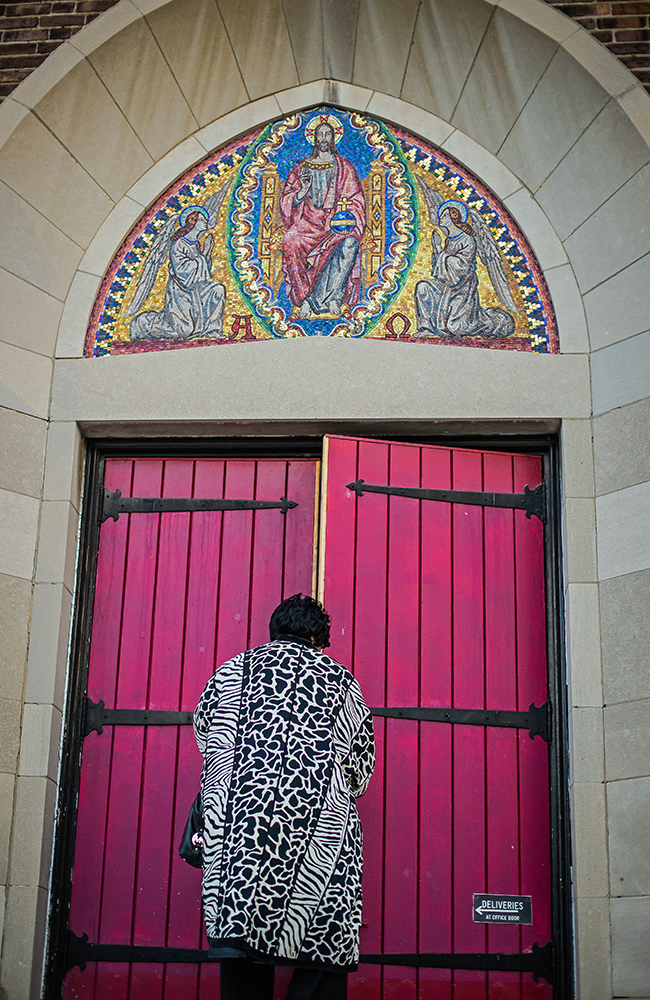sometimes a bright spring
morning may turn into the
very darkest day
good friday
To Church on a Friday, a Good, Good Day – St. Louis, Missouri
A Day to Think on Thorns and Crowns – Holy Week
Easter Wine – Casal Garcia Vinho Verde Rose – Parker’s Table – St. Louis
For most of my life, looking at this picture, I would have felt obliged to caption it with part of a saying in Psalm 23, “Do not gaze at wine when it is red, when it sparkles in the cup, when it goes down smoothly!” Indeed, I still believe that there is wisdom in that saying in its complete context. And, yet, only tonight in Bible study we read and talked about Jesus being the new wine, which was not to be poured into old wineskins. And you can read for yourself here about how he produced the finest of wines for the wedding of friends as his beautiful, beneficent first miracle. I think it must have been a rose.
Speaking of new wine, this rose from the Casal Garcia winery in the Vinho Verde region of Portugal, in my mind, was perfect for Easter day–light and sweet and fresh, like life returning–without being at all cloying. There will, thank God, be time and time and time again for the dark, dark red of Good Friday wine, of communion wine, but on Easter and Pentecost, though, the light and new seem fitting to me!
This particular rose has such a pretty label, too.

-image from Tony Fletcher’s Jamming
And if you live in St. Louis and like fine wines and beers, you really ought to know about Parker’s Table where this wine was bought, centrally located close to the southwest corner of Forest Park. Go and show them some love; they will return the favor.
Good Friday Haiku – St. Louis Tornado / Storms – April 22, 2011
church in a basement,
tornado sirens wail; we
are not forsaken
the communion loaf
is scored, grooves like lash marks baked
into remembrance
one body, one flesh,
making it home we find a
city blown by wrath
__________
The congregants at Grace and Peace Fellowship did have to go to the basement to finish the last half of their service unplugged and huddled around tables.
There turned out to be no damage in the immediate area, but coming home I found out about the damage at the airport and other areas. I also learned that a friend and his wife, who is 7 months pregnant, lost their home. And two dear young women from my own church, who lost their mother this past year and have had more than their share of trouble, also lost their home. Please pray for these two families and others who have lost so much.
Amidst it all, I do believe that Good Friday is still indeed good, and that because of it, because Christ was forsaken on the cross, we need not be, in life or in death.
“one final gift” – christmas tree haiku – dream of the rood part iii
weeping needles down
its via dolorosa;
sap scented fingers
______
Parts i and ii here.
Thine the Deadly Pain
O sacred Head, now wounded, with grief and shame weighed down,
Now scornfully surrounded with thorns, Thine only crown;
O sacred Head, what glory, what bliss till now was Thine!
Yet, though despised and gory, I joy to call Thee mine.
What Thou, my Lord, hast suffered, was all for sinners’ gain;
Mine, mine was the transgression, but Thine the deadly pain.
Lo, here I fall, my Savior! ’Tis I deserve Thy place;
Look on me with Thy favor, vouchsafe to me Thy grace.
What language shall I borrow to thank Thee, dearest friend,
For this Thy dying sorrow, Thy pity without end?
O make me Thine forever, and should I fainting be,
Lord, let me never, never outlive my love to Thee.
Crown II
Crown
Rerun (but with a new name): Redeeming Sadness
This post originally appeared on my old blog on September 15, 2006, exactly 2 1/2 years ago, so it is quite old. However, searching for some prose to publish, in supplement to all the recent pictures, I found this piece, which I was and am quite pleased with, even if the subject matter is difficult and deeply personal.
It is also appropriate to republish this just now because it uses the events of Good Friday and Easter as significant touchstones. And, so, I have also seen fit to change the title of the piece from simply “The Sadness Post” to “Redeeming Sadness.” Without further commentary, here you go…
_____________
Today, twice I watched my sensitive nephew’s lower lip stick out ever so slightly and quiver as he valiantly tried to fathom and control disappointment. First, as we sat down to dinner, his Veggie Tales plate was being given to a visiting cousin as there were only three of them and there were four children. I saw the lip and the frightened sadness in the big brown eyes. This time it lasted only a moment as the older of the cousins sweetly offered him her Veggie Tales plate, taking the ceramic “adult” plate for herself.
Later, the sadness was not so easily quelled. The visiting cousins were being given a sizeable chunk of his and his sister’s video collection to help them pass the time at Grandpa’s house. He went to his room and quietly began playing with his toys, but that lip and those eyes illuminated his soul, and when his Daddy came in and picked him up, the flood that the lip was trying to keep at bay overflowed in heaping sobs. His Daddy said that it was OK. OK to be disappointed and OK because the tapes would be back. Andrew clung to his Daddy in the full contact way that children do when the hurt is strong, burying his teary face into his Daddy’s shoulder. He stayed that way until we left, his Daddy softly assuring him.
This must be a journal entry from 3 years ago or so. Sorrow at its core emanates from a realization that things are not the way they should be, that loss has occurred. And children understand this implicitly, much as they seem to have an implicit understanding of fairness, even if they do not always put it into practice. And they are, if they are allowed, unafraid to express sorrow out loud. My nephew, five at the time, knew that the plate was his, that the videos were his, and he could not understand why they were being taken from him. There would, of course, be time to explain the virtue of sharing, some of which was done even as he was being comforted, but what my brother did at the time was to address his sorrow. To assure him that, indeed, in that instance at least, everything would be alright.
Of course everything is not alright. And as we grow, in situation after situation, we come to understand that the world is broken, beautiful, full of joys, yes, but broken nonetheless. Life, from one perspective, might be viewed as a succession of realizations of loss, each with its own attendant sorrow: the death of a pet, the death of a loved one, the death of kindness, the death of a friendship, the death of a marriage, the death and carnage in the world every day. Depending on the culture and family in which we grow up we are taught differing things about what to do with our sorrow, some positive, some soul numbing. Sorrow will not go away, though, until the world is healed, so it is important to get it right.
We are three friends sitting around a table intentionally, intently listening to a Sufjan Steven’s song. One of us has been suffering an unexplained illness for nearly a year.
“Tuesday night at the bible study
We lift our hands and pray over your body
But nothing ever happens”
The song ends and my suffering friend is drowned in sobs, that come as strongly and steadily as the waves of the ocean.
Whatever we may think about the mechanisms of creation and whether humans faced physical death before the Fall, we should be able to agree that it was not supposed to be like this. A young man is not supposed to suffer debilitation, his dreams for the future held in limbo over limbs that are unpredictably racked with pain. Sickness and famine were not meant to ravage a large percentage of the world’s population. And on the interpersonal level, the level we perhaps feel most viscerally, we were not meant to wound each other with actual violence or with words or with long stretches of silence and neglect. Communication was not mean to be fraught with such ambiguity and fracture.
Sorrow Models
There is no question the world is broken. If we are believers in Christ, though, woven into our spiritual DNA should be the belief that because Christ died and rose again and is returning one day, it will not always be so, that the world will be healed, that the groaning of creation will not be in vain. Jesus, however, though knowing those things, was not a smug triumphalist. He was, as it was prophecied about him, a man or sorrows acquainted with grief. He was rejected, often by those closest to him, by his hometown, at times by his family, by Judas. More poignantly he was rejected by his closest love, his child, his lover, his bride, the people of Israel, in a rejection as brutal as any divorce. All of that love poured through the centuries into a people flowed out in tears as he wept for cold-shouldered, belligerent Jerusalem.
Rejoice with those who rejoice; mourn with those who mourn.
It seems he shouldn’t have to, but the Apostle Paul tells us this in Romans, perhaps because we are so apt to simply disengage from one another. Why should this be so difficult? Are we jealous of the rejoicing? Are we afraid the sorrow might be catching. The sorrow should be catching. Jesus models it perfectly for us. Seeing Lazarus’ sister Mary and the mourners weeping, Jesus is deeply moved and troubled himself, and Jesus weeps. Jesus knows the power of his Father which is at his disposal. Jesus was in the ordaining counsels of eternity, he knows the end of all things, and yet still the sorrow of death impacts him. He allows it to. He participates in the brokenness of the world, not in practiced and showy empathy, but in true identification he absorbs the world’s pain, which he will do ultimately and to the greatest measure on the cross.
It is, in fact, because he has such faith in his Father that Jesus can so deeply identify with sorrow. Sorrow does not ultimately overwhelm him, does not paralyze him. He acts in the very moments following sorrow to maintain justice and to restore life and bring healing. After entering Jerusalem, Jesus’ tears over the city are closely followed by rage because the court of the Gentiles in the temple is being used for commerce, pushing out the peoples of all nations. And in the story of Lazarus, well, his very name has beome a metaphor of ressurected hope, of hope for the ressurection.
Perhaps we are so hesitant to feel sorrow ourselves because we feel we will not be able to plum its depths (we will not), that we will not be able to come up to the surface to see and feel hope (we have been promised that we will be able to). So, both refusing to embrace sorrow and also choosing to remain in it, in a way, both are symptoms of unbelief. As with any emotion, we may not be able to control that we feel in these ways, but what we do with these feeling is a matter of faith. If we are faithless, God is not, and we can certainly ask him for faith and strength, and perhaps, as the hymnwriter writes, begin by asking God to “take the dimness of our souls away.”
Sometimes I am apt to grumble a little when Jesus is presented as a model. “It is all well and good for him, Son of God and all.” Of course this is a lie, as he was tempted in every way as we are. Most importantly Jesus “modeling” was actually perfect obedience on our behalf so that we can have his righteousness, but it should also practically serve as an example for us. If we persist in wanting more “human” models, though, we do well to consider the psalmists. In many psalms, the psalmist is downcast, sometimes downright depressed, and sometimes there is not a resolution of this even by the end of the psalm. Even if the psalmist is still sad at the end of the psalm, though, the conclusion is never hopeless, “Why are you downcast, O my soul? Why so disturbed within me? Put your hope in God, for I will yet praise him, my Savior and my God.” This, then, is choice that is needed, to believe and to hope before the sorrow is soothed. As hard as it seems, this is the way of faith-filled sorrow. It is, I believe, a microcosm of the Faith itself, as we wait in this sorrow filled world for the redemption promised us and the Earth itself.
Ultimately, models are important because often we do not get very good modeling from those around us. This is true in a host of things from conflict resolution to parenting to healthy sexuality, and I think it also applies to our responses to sadness. “Oh, I see, it is possible to move on in sadness, to move through sadness.” Indeed, we are called to do just that.
Bearing the Load
Each heart knows its own bitterness, and no one else can share its joy.
Ouch! Are we really in this all alone? In joy and sorrow? Well, yes and no. I think we can more readily understand the part about “each heart knows its own bitterness.” “Nobody knows the trouble I’ve seen,” the old song goes. Though that old gospel songwriter also knew the secret that there is at least one person who does, that Jesus does.
As a side note, it is a bit stranger to believe that no one can share our joys. I militate against the thought. And yet it is true. My brothers, who are the closest people to me in terms of life experience, often have the same reaction to stimuli. A sight or smell, often barely perceptible to others, reminds us of our shared past. But even these loved brothers do not reside in my brain, in my soul, feeling the specific joys which make my heart sing. They cannot experience them in the unique way in which I feel them. And I cannot feel the uniqueness at the center of their joys.
Of course that is not the whole story. God made us as social beings, who are created to communicate and share life. Indeed, the central characteristic of our creation in God’s image may be that we can relate spiritually and physically to God and to one another. If we cannot completely access one another’s deepest reaches (I wonder whether we’ll be able to do that in heaven?), and if on a fundamental level we do come before God as individuals, we are, nonetheless, called together, corporately as the church, and we absolutely need one another to live.
It is the same kitchen table, one year earlier. The burden of years of sorrow is once again becoming unbearable. As I lay out my prayer requests, it begins, like the quivering of my nephew’s lip that cannot hold back the tears. My body is convulsed with sorrow and the words simply cannot rise to the surface. A friend quietly, strongly (with the strength of true manhood) hugs me until they can.
It is not simply an academic point to me to insist that we can and must help one another in sorrow. In the darkest days of the same sorrow that led to my kitchen table catharsis, my brother and sister-in-law’s house was so important to me, even if it meant an additional hour of driving to and from every day. There was very little that talking could accomplish at that point, instead they both lovingly listened. I am sure they were inwardly burdened and frustrated by their inability to change anything, and perhaps at times with the monotony of my sorrow. Their listening was helpful, but it was their welcoming of me to simply be there that was more important. The little yellow room above the street. My brother waking me in the morning, sometimes crawling under the covers for a little while as I woke up to the cold, dark morning. Being able to hold my baby niece, which, in and of itself, fed life into me. There are limits to what we can do for one another, we cannot heal the sorrow itself (and it will lead to trouble if we try), but we can, we must, be with one another as God heals us of our hurts.
If we are prone to look down on such gestures as accommodations of weakness and eschew them, we completely miss the point of the Gospel. More poignantly, though Jesus did not share in our sinfulness, he shared our need for company and comfort in sorrow. Jesus’ travail in the Garden of Gethsemane was a lonely and painful wrestling before God, but yet he too is comforted by angels. I cannot really describe the scene better than Michael Card does in his lovely song “In the Garden.”
Trembling with fear, alone in the garden
Battle before the final war
Blood became tears, there in the garden
To fall upon the silent stone
There in the darkness the Light
And the darkness stood still
Two choices, one tortured will
And there once the choice had been made
All the world could be saved by the One in the garden
The light of the dawn, was seen in the garden
By gentle eyes so sadly wise
The angels appear, they come to the garden
Clothed with sighs, they realize
The One they adored from the start
Will be broken apart
By the ones He had come to save
So their here simply now to be near
He’s no longer alone, they sit by moan
Enough is Enough
Some may be tempted to say, “Enough with the sorrow already.” On one level, I could not more strongly disagree. Our lives, the world at large, will not be free of sorrow until the world is healed. On the other side of the equation, though, the world is going to be healed! If we are believers in Christ, we will be healed! We are being healed! Moreover, God has promised to work everything out for our good if we are believers. To persist in believing that our sorrow makes us bereft, without hope in this world, to believe, atonishingly, that God will never again bring good into our life, is simply unbelief. And, so, there may come a time when we have to say to ourselves “enough is enough.” And I very pointedly mean, “say to ourselves.” Can anyone else say this to us? Perhaps a pastor, perhaps an elder, perhaps a friend? I do not know, but if they feel they need to, it must be said with so much care and love. In believing God, though, we must come to such points if we are to live faithfully. We must move on and not remain paralyzed with sorrowful unbelief, which often becomes a sort of sick comfort in itself, which we are so fearful to leave behind and walk forward trusting God.
In a topic that deserves detailed consideration on its own, it is almost shocking how strongly that fearful unbelief is condemned in the Bible. The fearful servant who does not utilize the talents he has been entrusted is condemned. Left outside of the heavenly Jerusalem in Revelation, along with the “the vile, the murderers, the sexually immoral, those who practice magic arts, the idolaters and all liars” are also “the cowardly, the unbelieving.” Fundamentally, condemnation results from not believing what God as said about reality, about ourselves. From these observations, we should not jump to the conclusion that long term sorrow is equivalent to a jump into the lake of fire (if we are in Christ we are freed from this end), but sometimes perhaps we need to feel the weight of the admonition to not be that way, to not act and live like hope-less unbelievers.
I am not a preacher, but I understand through the writing of this post and many others, the maxim that first one preaches to oneself. I must believe the message that is being conveyed through me, receive the grace that it imparts. Believing these truths in this area continues to be one of the hardest things in my life. But whenever I feel unable to believe, I must simply ask and help will be given, either directly or through the mediation of other believers. It may not be a quick process, but Jesus will be gentle and will heal us. I need to keep reminding myself of that truth.
Brother, let me be your servant
Let me be as Christ to you
Pray that I may have the grace
To let you be my servant, too
We are pilgrims on a journey
We are brothers on the road
We are here to help each other
Walk the mile and bear the load
I will hold the Christlight for you
In the night-time of your fear
I will hold my hand out to you
Speak the peace you long to hear
I will weep when you are weeping
When you laugh I’ll laugh with you
I will share your joy and sorrow
Till we’ve seen this journey through
When we sing to God in heaven
We shall find such harmony
Born of all we’ve known together
Of Christ’s love and agony
Brother, let me be your servant
Let me be as Christ to you
Pray that I may have the grace
To let you be my servant, too







